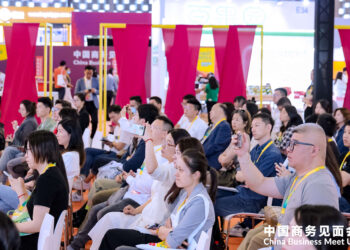No products in the basket.
BEIJING, Nov. 20, 2023 /PRNewswire/ — A report from China Daily:
In front of the camera, Manzoor Hussain Soomro, 67, in a suit, burst with vigor. Speaking of the role of youth in the Belt and Road Initiative (BRI), he cast his eyes to the volunteers present with visible excitement. “They are the future,” he said. “They are more energetic than our generation and more adapted to modern technology, and they are the world’s future leaders.”
It was the seventh time that Professor Manzoor Hussain Soomro has taken part in the Belt and Road Teenager Maker Camp and Teacher Workshop. The sight of the teachers and students from Azerbaijan, Iran, Kazakhstan, Kyrgyzstan, Pakistan, Tajikistan, Uzbekistan, countries along the Belt and Road, as well as the Chinese volunteers who worked at the venue, impressed him with the aim of the event: to draw on the power of youth. A sustainable supply of talent is a decisive factor for growth in the field of science and technology and beyond.
Railways, roads and bridges bring in engineers
” Science and technology are powerful. For countries with young people who are not good at the development and application of technology, they must seek cooperation to catch up,” Soomro said. The Pakistani teacher is committed to researching international scientific and technological collaboration, especially collaboration among BRI partners. He is recognized as an international heavyweight as Vice President of the Belt and Road International Science Education Consortium (BRISEC) and a recipient of the Chinese government’s Friendship Award in 2020.
Soomro refers to Pakistan, his home country, as a laboratory for many collaborative projects between China and other BRI partners. In recent years, he has seen railways, highways, bridges, dams and other large infrastructure projects spring up in Pakistan as a result of close collaboration with China. Upon the completion of these projects, many Pakistanis have been employed for the daily maintenance of the facilities, after which they would be trained to be engineers or technicians with scientific literacy. “It will offer great access to science education [for young people in developing countries], Soomro said. As part of the BRI, youth training has kept pace with the times and has delivered remarkable outcomes.
A teenager grows out of a village without electricity
Soomro grew up poor in a hot Pakistani village with no electricity and little access to information.
His father, a farmer, had no formal education but was wise in raising his young son, encouraging his curiosity about and exploration of the world of science, including astronomy.
As a student, Soomro had a strong desire to escape poverty. He loved science, and as he explored it, he came to realize the significance of communication and education for individual growth. After excelling in various science competitions he was awarded the President’s Merit Scholarships in Pakistan and travelled to the United Kingdom to pursue a PhD. He has gradually earned his place on the international stage and has been engaged in more and greater international collaboration.
Technology gives the underprivileged access to education
Working experience in UNESCO, FAO UN and other organizations has made Soomro deeply aware of the role of science and technology in helping the disadvantaged. In the past, in some remote rural areas, schools were understaffed and under-equipped, especially for subjects such as physics. Science is dynamic but generally the teachers don’t get updated training. As a consequence, their education quality lagged far behind that of city schools. The introduction of distance education and collaboration with external teachers has made it possible to greatly improve education in poor areas. However, there is no replacement for the face to face interaction.
Personalized learning is also more favorable for education as artificial intelligence is introduced into traditional classrooms, Soomro says. Students can adjust the pace and difficulty of their learning to suit their needs, and those with disabilities and those who speak different languages are no longer shut out of education.
“Young people can work together instead of just competing and comparing with each other.” “The future of work will change drastically, but it is predictable that strong critical thinking, analytical capability, adaptability and continuous learning will all be vital for young people.”
Through the Maker Camp organized by the China Association for Science and Technology and local governments, he says, he expects young person will find their own unique strengths, discover themselves and will learn to work with others while pursuing their dreams. His idea is consistent with the vision of the BRI: drawing on one’s strengths so as to achieve growth that everyone benefits from.
Source : Soomro: A global expert shines light on opportunities in science for the young
The information provided in this article was created by Cision PR Newswire, our news partner. The author's opinions and the content shared on this page are their own and may not necessarily represent the perspectives of Thailand Business News.
Discover more from Thailand Business News
Subscribe to get the latest posts sent to your email.
Please login to join discussion










